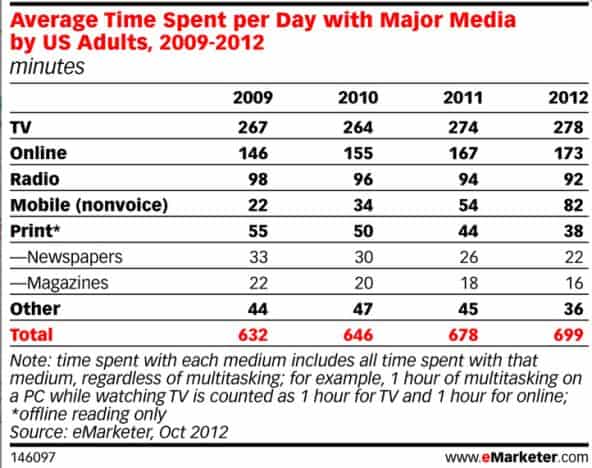Some fairly big news came out recently regarding the computer industry and I was surprised how little attention it received in the marketing blogosphere. Computer PC (desktops and laptops) sales dropped 14% in the first quarter of 2013 as reported by International Data Corp, the biggest quarterly drop since this data first was published in 1994. This was the fourth consecutive quarter of year-on-year declines. Total worldwide PC sales fell to 76.3 million units in Q1 of 2013 and were at the lowest level since the middle of 2009, according Gartner Inc.
Does this mean fewer people using computers? Of course not. Most analysts at the time speculated of the announcement that the main driver of this downward trend is due to the rise of smartphone and tablet usage. These assumptions were essentially supported when it was later reported that notebooks and smaller laptops that saw the biggest loss in market share.
For marketers, the headline here is not as much the decline in PC sales but rather the increase in mobile usage. According to eMarketer, (non-voice) mobile usage has increased with U.S. adults almost 300% — from 22 minutes a day in 2009 to 82 minutes in 2012.

At this point, most marketers have recognized that mobile is an important channel and have adjusted their advertising strategies to follow the consumer trend. There’s been a lot of thought leadership both internally within marketing organizations and externally in the blogosphere about the differences that exists with mobile marketing versus standard, fixed web advertising.
As we approach the future, it seems inevitable that mobile device will become the primary way in which the world connects to the web. When that day arrives, what will be the important things advertisers need to remember about fixed web marketing?
The following are a few safe assumptions regarding fixed web usage that marketers may want to consider in the era of mobile dominated computing. How can media and creative strategists best apply these insights to impact and influence fixed web consumers?
- Important locations. Because PC devices are fixed to a specific location, they will most likely be set at important locations such as at the consumer’s workplace or home. Some brands may find their messages are best presented to their customers at their most intimate locations.
- Larger screens. Phones and tablets are growing bigger every new tech season, but portability constraints will eventually cap their size. Desktop computer monitors are usually over 20” and can be as big as any full-size TV. With these larger screens, marketers can engage consumers with different experiences than on their smaller, mobile cousins.
- Less multi-tasking. Consumers now use their mobile devices while they’re watching TV, riding the bus, sitting in doctors’ offices, and even when they use the bathroom. It doesn’t mean fixed web users won’t be multi-tasking as well, but there will probably be a bit more ability to capture their undivided attention when using desktop PCs.
- Can print. Most mobile devices of the future will be connected to a printer somewhere, but fixed web computers will most likely always have a printer nearby. Thus, for tasks such as forms to be signed by pen, arts and crafts projects, etc. marketers can assume the fixed web user will have immediate access to a printer.
- More inner space and peripherals. Desktop computers have space for many ports and plugs for not only mice, printers, and keyboards – game controllers, elaborate audio and speaker systems, etc. There’s also space inside for larger cores, more ram, additional hard drives, etc.
- Longer life. Many consumers change out their smartphones every two years in line with their cellular contracts. As well, mobile devices are easy to lose. In fact, 31,544 cell phones were left In NYC cabs in just 6 months. Desktops tend to stick around for years and software, bookmarks, documents, stay as a constant fixture in these consumers lives.
Globally, more people have access to cell phones than toilets and soon mobile phones will outnumber people. Marketers are strengthening their mobile strategies in preparation of this revolution but should still remember the desktop computer will be a fixture in consumer lives for years to come.
